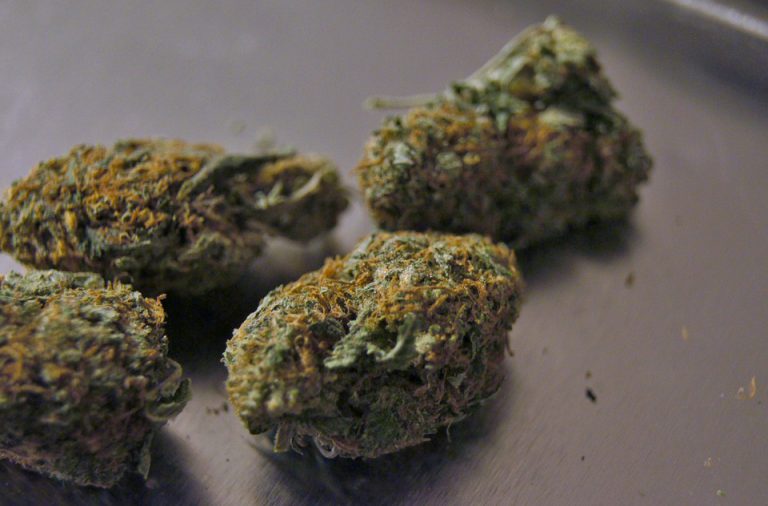Since February, patients in Illinois have been able to swap their opioid prescriptions for marijuana. And many are doing just that.
They’re part of a program designed to let patients who might not qualify for the state’s regular medical marijuana program exchange an opioid prescription, like Oxycontin, for weed.
“We have almost 900 patients enrolled in the program now,” said Conny Mueller-Moody, who works on medical cannabis at the Illinois Department of Public Health. “And over 300 physicians who have created a user account and submitted a physician certification for a patient.”
There is no restriction on what conditions qualify for the program, only that the patient have an existing relationship with the provider and an existing opioid prescription. Certification must be renewed every 90 days.
Treating chronic pain
The state is still gathering statistics on why patients are participating. But nationwide, chronic pain is the most common reason people turn to medical marijuana.
And for some people, pot is more appealing than powerful opioids.
Gavin Glass is a student at Southern Illinois University who has suffered from back and nerve pain since he was in high school. He was barely able to get through his classes, he said, and struggled to make it through the day.
“I was never actually on any opioids. But they were certainly recommended to me,” he said.
Because he refused opioids, Gavin is part of the state’s medical marijuana program, not the opioid alternative program. He says medical marijuana has made a huge improvement in his life.
“I felt like I had got my life back again and I was I felt comfortable doing things because I wasn’t in pain all the time,” he said.
The list of patients for the alternatives to opioids program is confidential, and Illinois Newsroom was unable to reach anyone who is participating.
Data from 2016 shows an estimated 50 million Americans experience chronic pain. There are many reasons someone can experience long-term pain, for example, lingering impacts of an accident or injury, or as a result of a chronic illness like rheumatoid arthritis or diabetes.
Chronic pain is challenging to treat, in part because many people will need to take medication for many years. That increases the risk of side effects and addiction, particularly when it comes to opioids. Even over-the-counter drugs, like ibuprofen, can have serious side effects if someone takes them for a long time.
The science of marijuana
But not everyone is sold on the benefits of marijuana. And because the federal government limits research on it, the impact is still uncertain.
“The problem is that the medical marijuana there’s a lot of anecdotal evidence, there’s not a lot of true scientific studies out there with double blind studies or any scientific background whatsoever,” said Bill McCreary, a retired pharmacist and member of the Center for Rural Health at Southern Illinois University.
Still, McCreary supports the medical marijuana program, noting that everyone responds differently to treatment. And he says opioids carry greater risks than the chemical components of pot.
“The long term effects of opioids are, at this point, we think, much more serious than long term effects of cannabinoids and THC,” he said.
Patients taking medical marijuana say they have fewer side effects than other medications. And states that allow marijuana use show a drop in prescriptions for opioids.
“With opioids, we know that the neural functioning of the brain is actually altered. And it doesn’t come back,” said McCreary.
Pot also makes overdose less risky. In 2017, there were more than 2,000 opioid-related deaths in Illinois.
That doesn’t mean patients can’t overdose on marijuana – they can, though it’s extremely unlikely for adults. And even if that happens, it’s unlikely to result in death.
Treating pain
Dr. Peter Grinspoon is a physician in Massachusetts, where medical marijuana has been legal since 2012. He believes it’s effective, especially for patients who need lifelong pain management.
“If you have to have a substance for life because of chronic pain,” he said.
“Your life is so much better on cannabis, which doesn’t take anything away from you than it isn’t opiates, which sort of sucks the life out of you.”
But Grinspoon also sees a role for regulation, particularly how medical marijuana is packaged and sold. He’s especially cautious about edibles that can appeal to children, who are vulnerable to overdosing.
“If marijuana or cannabis is a medicine, then don’t put it in something that tastes good. You wouldn’t put ibuprofen in the gummy bear. Why would you put cannabis in the gummy bear?” he said. “A 4-year-old kid or a dog wouldn’t know the difference and they’ll eat the whole bag.”
He also noted that smoking anything can increase the risk of developing lung cancer, and said he typically recommends vaping or taking pills that dissolve under the tongue.
Grinspoon also notes that some people are not good candidates for marijuana. It shouldn’t be used by adolescents or by women who are pregnant or breastfeeding. And patients shouldn’t drive while using it, which is true of many pain medications.
Looking Forward
The Illinois program requires doctors to have an existing relationship with the patient requesting marijuana – in part so they can discuss these concerns. .
The alternatives to opioids and medical marijuana program will expire in June of 2020, unless it’s extended by the state legislature or marijuana is completely legalized, as Gov. J. B. Pritzker has proposed.
This story was produced by Side Effects Public Media, a news collaborative covering public health.

